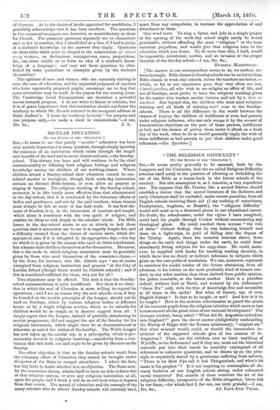SECULAR EDUCATION.
(TO THE EDITOR OF TAB " SPECTATOR.")
SIR,—It seems to me that purely " secular " education has been very unduly depreciated in many quarters, through simply ignoring the existence of an institution which exists through the length and breadth of the land and in every church and sect,—the Sunday- school. This always has been and will continue to be the chief instrumentality in diffusing both religious feelings and religious knowledge among the children of our working-classes. Where children attend a Sunday-school their education cannot be con- sidered secular or irreligious, though their week-day instruction contain no distinct Bible-lessons, or even allow no prayers or singing of hymns. The religious teaching of the Sunday-school, moreover, is in this vastly more effective than that administered in the day-school, that it is conducted by the voluntary efforts of ladies and gentlemen, and not by the paid teachers, whose lessons must always be felt as more or less task-work. It has that ele- ment of freedom in it, in the intercourse of teachers and taught, which alone is consistent with the true spirit of religion, and enables its ideas to sink deeply in the scholars' minds. The Bible lesson in the day-school seems to me so utterly to lack these qualities that it astonishes me to see it so eagerly fought for, and a difficulty created from the claims of various sects, which dis- appears at once if it is relegated to its appropriate day,—the day on which it is given by the classes who need no State interference, but educate their children themselves or for themselves. Moreover, this is the mode in which religious instruction must be generally given by those who avail themselves of the conscience clause,— by the Jews, for instance, who Mr. Abbott says "are of course exempted from religious instruction and prayers" at the City of London School (though theirs would be Sabbath schools) ; and if this is considered sufficient for them, why not for all ?
Two objections may be offered. The first is that the Sunday- school accommodation is quite insufficient. But there is no direc- tion in which the zeal of Churches is more willing to expand its operations ; and I see no reason why the new schools, even if they be founded on the secular principles of the League, should not be used on Sundays, either by various religious bodies at different hours, or by a single religious service, which to be suitable for children would be so simple as to deserve support from all. I deeply regret that the League, instead of partially abandoning its secular programme, did not suggest the use of the Sunday for the religious instruction, which might then be as denominational or otherwise as suited the wishes of the locality. The Welsh League has now taken up the secular cry, in a principality which is pre- eminently devoted to religious teaching,—manifestly from a con- viction that this both can and ought to be given by the sects on the Sunday.
The other objection is that as the Sunday-schools result from the voluntary effort of Churches, they cannot be brought under the power of the State to compel attendance. I admit the fact, but beg leave to doubt whether it is an objection. The State now, by the conscience-clause, admits itself to have no title to force this or that religious system, or even any religious instruction at all, upon the people, and I think it will be an evil hour when it departs from that course. The spread of education and the example of the many scholars who do attend Sunday-schools will certainly tend, apart from any compulsion, to increase the appreciation of and attendance at these.
One word more. To sing a hymn and join in a simple prayer at the opening of the week-day school might surely be found practicable, without offending the most " religious " or the most sectarian prejudices, and would give that religious tone to the education which you desire. To do more than this, I hold, would be impossible, unnational, unwise, and an invasion of the proper function of the Sunday-school.—I am, Sir, &c.,
RUSSELL MARTINEAU.
[rho answer to our correspondent seems to us, we confess, ex- tremely simple. Bible classes in Sunday schools can be no better than Bible classes in week-day schools, unless the teachers are better,— which, as far as our experience goes, they very often are not. Czteris paribus, all who wish to see religion an affair of life, and not of Sundays, must prefer to have the religious teaching given by the master who teaches secular lessons, and not by a dens machinti. But beyond this, the children who most need religious training and all kinds of training won't come to the Sunday- schools. There is all the difference in the world between the chance of keeping the children of indifferent or even bad parents under religious influence, who can only escape it by the avowal of conscientious objections on the part of those parents, indifferent or bad, and the chance of getting them under it afresh on a fresh day of the week, when to do so would generally imply the wish of those indifferent or bad parents to put their children under good influences.—En. Spectator.]








































 Previous page
Previous page